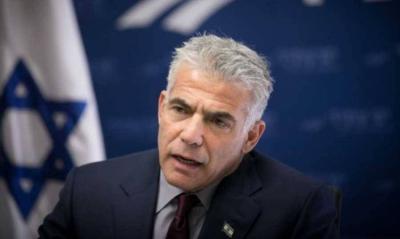Israeli Prime Minister Yair Lapid stated on Wednesday that Tel Aviv opposes the anticipated nuclear agreement with Iran, describing it as "bad" because it grants Tehran numerous privileges. Lapid remarked, "We oppose this agreement with Iran because it is bad and cannot be accepted in its current text," pledging to act to prevent Iran from becoming a nuclear state.
The Israeli Prime Minister clarified that his country would not be bound by this agreement if it is signed. He added, "We are holding an open dialogue with the American administration on all disputed issues. I appreciate the Americans' willingness to listen to us and to work with us. The United States has been and remains our closest ally, and President Biden is one of Israel's best friends throughout its history."
He continued that the current proposed agreement would grant Iran one hundred billion dollars annually, noting that "this money will not be spent on building schools or hospitals. This one hundred billion dollars will be spent on destabilizing the Middle East and promoting terrorism worldwide."
Lapid explained that Israel does not oppose the agreement in principle, but "we oppose this agreement because it does not meet the standards set by President Biden himself, who has committed to preventing Iran from becoming a nuclear state." He further pointed out that this agreement "jeopardizes the independence of the International Atomic Energy Agency and creates political pressures aimed at closing open files without completing professional investigations into them."
**Relative Progress**
Iran's Foreign Ministry stated on Monday that "relative progress" has been made in the negotiations aimed at reviving the 2015 nuclear agreement, while simultaneously accusing the U.S. of "stalling" in the negotiations. This statement from the Iranian Foreign Ministry comes amid increasing signs of a possible near agreement between Tehran and Washington, which would see the latter return to the deal from which it withdrew in 2018.
Iranian Foreign Ministry spokesman Nasser Kanani reported in a press conference in Tehran that "good relative progress" has been made in the talks to revive the 2015 nuclear agreement, according to Reuters. However, Kanani accused the United States of "stalling" in the discussions, asserting that Tehran seeks a lasting agreement that preserves its legitimate rights.
Currently, talks revolve around a final European proposal regarding the indirect nuclear negotiations between Washington and Tehran, with Brussels stating that it is considering Iran's response to the proposal. After 16 months of intermittent and indirect talks between the U.S. and Iran, during which the European Union shuttle-diplomacy took place, a senior EU official stated on August 8 that the bloc had made a "final" offer.




